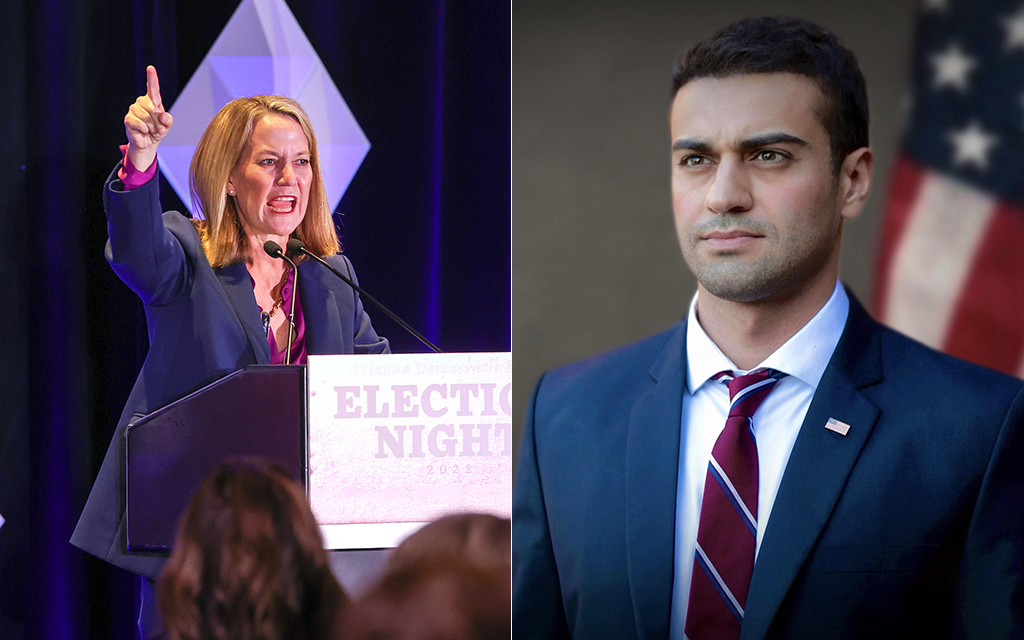PHOENIX – In a campaign where abortion took center stage, Democrat Kris Mayes and Republican Abraham Hamadeh were locked in an extremely tight battle Wednesday in the race to become Arizona’s next attorney general.
Mayes addressed supporters early Tuesday night at a Democratic watch party in downtown Phoenix, telling the crowd that while the race was expected to be tight, “It’s certainly looking good … isn’t it?” At that point, she held an advantage over Hamadeh. By Wednesday afternoon that had changed, and only a few thousand votes separated the two.
“We need to trust the process,” she said. “Let’s hold out hope – for sanity versus chaos, love versus hate, and healing versus polarization.”
Earlier in the day, Hamadeh took to Twitter to encourage his supporters to “text, call, grab your friends and make sure they vote!”
“We are going to show the world what a ‘threat to democracy’ looks like,” said Hamadeh, one of several Republican candidates who reject the results of the 2020 election and are aligned with former President Donald Trump. “We are taking our country back.”
The responsibilities of the attorney general include providing legal advice to state agencies, enforcing consumer protection and civil rights laws, and prosecuting criminals charged with complex financial crimes and certain conspiracies involving illegal drugs. The office can also bring lawsuits on behalf of the state.
The campaigns raised multiple issues, but abortion rights remained at the forefront. And on that issue, Arizonans had a choice between two polar opposites.
Hamadeh promised to uphold Arizona’s ban on abortion, while Mayes vowed to challenge any abortion prohibition in court and to forgo prosecutions of those involved in the procedure.
“I will never prosecute a doctor, a nurse, a midwife, a pharmacist or a woman for abortion or reproductive services – period,” Mayes told Cronkite News in a September interview. “And I will strongly discourage any county attorney from prosecuting anyone for abortion in the state.”
Mayes argued that the right to privacy in the state Constitution makes such bans illegal because of the “incursion onto the privacy of women’s lives.”
Hamadeh disagreed, and when debating Mayes, said people vote for attorney general to uphold the law and not to act as “superlegislators.”
“The law is the law,” he said. “I don’t want to make the law. That’s the job of the Legislature. I enforce the law.”
As Arizonans went to the polls Tuesday, voters pointed to the upheaval over abortion as a concern.
“Women’s rights are very important to me,” said Anya Schedin, 19, a first-time voter who attends Arizona State University. “I want access to my own health care rights.”
Erika Araiza, 48, of Gilbert, said she supported “a conservative approach” and didn’t mince words in expressing her disgust with candidates who support abortion rights.
“Democrats want to kill babies,” she said.
All across the U.S. this Election Day, abortion was a pivotal issue after the U.S. Supreme Court in June overturned Roe v. Wade and gave states the right to decide their own abortion laws.
In a national Kaiser Family Foundation poll, half of respondents said they were more motivated to vote because of abortion issues. Another survey by The New York Times and Siena College found that social issues including abortion were a big factor for Arizona voters, women in particular.
Arizona’s abortion landscape has been in flux since the Supreme Court overturned Roe. Amid numerous challenges, courts continue to weigh whether a prestatehood law banning abortion, even in cases of rape or incest, can take effect. Meantime, a newer, 15-week abortion ban is the law of the land in Arizona.
Beyond abortion, securing the southern border was another big issue in the race, especially as more fentanyl makes its way into the country – contributing to an uptick in overdose deaths.
Hamadeh said he would classify drug cartels as terrorists and use war powers to combat illegal migration, although only the federal government has the authority to declare a war and classify a foreign group as a terrorist organization.
Mayes had a different take, saying ports of entry into the U.S. need to be upgraded and modernized to “catch the problem before it gets here.”
Mary Ellen Barker, 64, of Phoenix, said she voted Republican across the board and hoped to see a crackdown on border crossings and drug smuggling.
“Our border is being invaded daily,” she said. “We have people dying every day from drug overdoses that come from Mexico and China. It’s killing our young people.”
Mayes pointed to water supply preservation, consumer fraud, elder abuse and upholding democracy as other major issues in the election. Hamadeh, meantime, promised to “fight back against the insanity of Big Tech, against the ‘woke’ left corporations who boycott states and condemn America … and against Washington’s overreach into the daily lives of Arizonans.”
Both candidates called the other unqualified. Mayes is a lawyer and professor at Arizona State University who previously served two terms on the Arizona Corporation Commission and worked as a political reporter for The Arizona Republic. Hamadeh is an Army Reserve intelligence officer who was stationed in Saudi Arabia. He formerly worked as an attorney with the Maricopa County Attorney’s Office.
Overall, Arizona voters went to the polls with the mentality of wanting to “fix” something – whether the state of the economy, illegal immigration or reproductive rights.
Phoenix voter Dylan Wilkens, 25, said he believed some candidates want to set the country back, while others seem to be striving to “bring more equality, human rights and freedom for us all.”
“I want to do what I can to stop anything bad from happening, so we can move forward,” he said, “not backward.”
Reporters Natalie Skowlund, Laura Bargfeld and Deanna Pistono contributed to this story.



